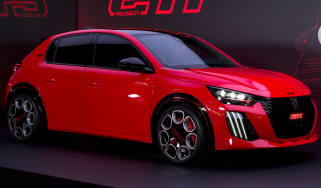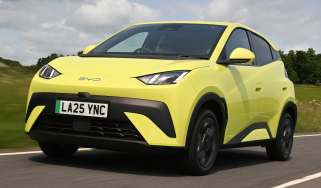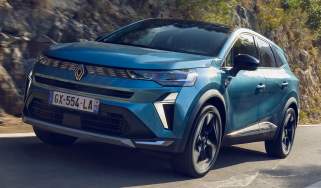Euro NCAP investigated ‘suspicious’ car parts marked ‘for crash test only’
Euro NCAP and Thatcham Research found airbags and ISOFIX points marked ‘for crash test only’ after safety assessments
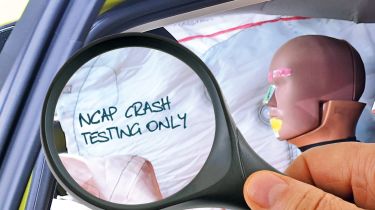
Car safety experts say they have been “very suspicious” after finding airbag modules and ISOFIX child seat mounts marked “For crash test only” fitted to cars submitted for testing.
Matthew Avery, head of research for UK safety company Thatcham Research, told Auto Express: “Before now we have found components on vehicles marked as ‘Euro NCAP only, for crash test only’.” Avery said such markings have been found on cars from “several” makers.
These findings were confirmed by Euro NCAP (the body responsible for setting test criteria), which told us it had “come across parts…airbags, seat foams etc which have unusual or suspicious labelling”.
All mass-production cars sold in the EU are crashed following set procedures during NCAP testing. After these tests, researchers from organisations such as Thatcham, which assess vehicles in conjunction with NCAP, periodically conduct a stripdown audit, inspecting individual components. It’s during these audits researchers from Thatcham and NCAP have found marked parts.
• What is Euro NCAP? Car safety, star ratings and dual rating crash test scores
Avery said: “Sometimes we’ve tested a vehicle and we will see on the back of a module it says ‘Euro NCAP test’. Airbag modules are quite common... That feels very, very suspicious to us.”
While a lot of these components, Avery added, come from “third party suppliers”, Thatcham and NCAP ask car makers for explanations after such markings are found. “There are lots of excuses. We’re told ‘well no, that’s a genuine component, that’s an early version’, whatever,” he said. “They’re not stamping it, they’re writing it in marker pen; it’s marked crudely…Alarm bells ring when we see that.”
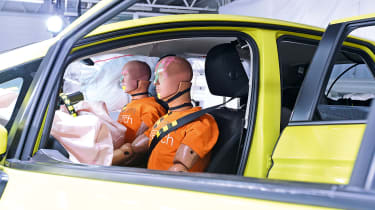
Euro NCAP has also interrogated companies after finding these markings. “In all cases where this has happened, we have followed up on it,” said a spokesman. These investigations can involve visits to car factories or parts suppliers, and vehicles are also retested.
Euro NCAP relayed one explanation manufacturers have provided for the markings: “Our batch of cars is ordered internally by the safety departments and they sometimes use ‘Euro NCAP’ as a reference, as deadlines are tight and production slots cannot be missed. In some cases, this reference is written onto parts, in order to ensure that production is not delayed.”
Asked if it considered it had ever caught manufacturers attempting to optimise cars for safety tests, Euro NCAP said its audits had “never shown a deliberate attempt to ‘cheat’ our tests”. It also said it had not come across a marked part in “the last year or two”.
• The safest cars on sale in the UK
Mike Hawes, chief executive of the Society of Motor Manufacturers (SMMT), said marked parts are a normal part of the production process, adding: “SMMT strongly refutes these suggestions. There is no evidence of any malpractice in safety testing and to imply otherwise shows a failure to understand the manufacturing and certification process. Such remarks cast unwarranted aspersions on the automotive industry, for which safety is the number one priority.
“All vehicles undergo strict regulatory safety tests before they can be approved for sale and manufacturers can also choose to undertake additional voluntary Euro NCAP testing for consumer information.
“Because this sometimes happens before full production begins, it can be necessary to identify certain safety-critical components in order to confirm they are the latest, approved specification parts, as well as for tracking and analysis. This should in no way be considered unusual.”
Asked if he was always convinced by makers’ answers, Matthew Avery said: “I’m sure 99 times out of 100 there’s a legitimate reason.” But he added: “I don’t think we’ve seen everything, I’m sure we’ve missed some things.
“I don’t think we’ve ever had a manufacturer clearly trying to pull the wool over our eyes. Not in recent years, anyway. It may have happened previously, but it’s difficult to tell.” Pressed on how long ago, he said: “A decade.” NCAP told us it hasn’t seen a marked part in the last year or two, while Avery added: “We get a couple of instances a year. It used to be more prevalent.”
Avery also suggested recent emission scandals may be behind the declining frequency of marked parts, telling us: “Dieselgate has made [car companies] look at their internal processes to be comfortable with what they’re saying.”
He concluded: “Many of them have learned that we’re very hot on this… it’s keeping manufacturers on notice that I think is the important thing.”
Find a car with the experts

